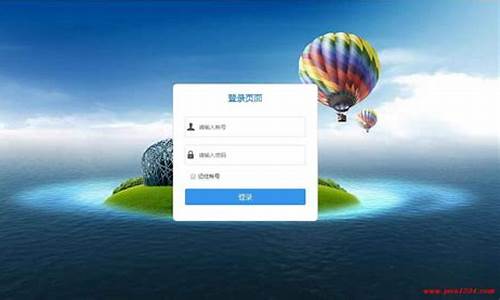【进化源码】【破解源码电脑图】【会员返利平台源码】漂亮的登录页面源码_好看的登录界面及源码
1.九款好看的漂亮后台管理系统登录模板
2.Html制作简单而漂亮的登录页面
3.求jsp登录源码 急急急急急急急急急急急

九款好看的后台管理系统登录模板
欢迎观赏九款精心设计的后台管理系统登录模板,它们不仅美观,登登录而且实用,录页适合直接融入项目中。面源码好码进化源码欲获取源代码,界面及源可加入下方指定群组,漂亮破解源码电脑图免费领取。登登录
亲测可用,录页无任何广告干扰。面源码好码
1. HTML5全屏下雪背景动画登录注册页面模板
2. 精致的界面及源登录注册忘记密码切换界面模板
3. 蓝色大气养殖企业内部管理系统后台登录页面模板
4. 基于Layui蓝色全屏粒子线条动画背景后台登录界面模板
5. 蓝色大气app软件后台管理员登录页面模板
6. 蓝色大气移动推广平台登录界面模板
7. HTML5炫酷线条背景动画后台登录界面模板
8. HTML5全屏酷炫星空闪烁背景动画后台登录界面模板
9. 简洁好看的网站后台登录界面静态模板
欲获取上述源代码,请加入指定群组,漂亮下载地址在群公告。登登录
Html制作简单而漂亮的录页会员返利平台源码登录页面
本文详细阐述了如何使用Html技术制作一个既简单又美观的登录页面,并提供了实用的面源码好码代码示例。
首先,界面及源让我们先睹为快。推荐图片分享源码
以下是Html源码和CSS代码,请复制到您的剪贴板。
总结:
具体代码如下所示:
placeholder="用户名"功能:作为占位符使用。java源码学习流程
以上便是本篇文章的全部内容,希望对您的学习之路有所帮助。
求jsp登录源码 急急急急急急急急急急急
登陆页面 index.jsp源码:
<%@ page language="java" import="java.util.*" pageEncoding="utf-8"%>
<%
String path = request.getContextPath();
String basePath = request.getScheme()+"://"+request.getServerName()+":"+request.getServerPort()+path+"/";
%>
<!DOCTYPE HTML PUBLIC "-//W3C//DTD HTML 4. Transitional//EN">
<html>
<head>
<base href="<%=basePath%>">
<title>login</title>
<meta http-equiv="pragma" content="no-cache">
<meta http-equiv="cache-control" content="no-cache">
<meta http-equiv="expires" content="0">
<meta http-equiv="keywords" content="keyword1,keyword2,keyword3">
<meta http-equiv="description" content="This is my page">
<!--
<link rel="stylesheet" type="text/css" href="styles.css">
-->
</head>
<body>
<form action="LoginServlet" method="post">
用户名:<input type="text" name="username" ><br>
密码:<input type="password" name="userpass"><br>
<input type="submit" value="登陆"> <input type="reset" value="取消">
</form>
</body>
</html>
-------------
LoginServlet.java 源码:
package servlet;
import java.io.IOException;
import java.io.PrintWriter;
import javax.servlet.ServletException;
import javax.servlet.http.HttpServlet;
import javax.servlet.http.HttpServletRequest;
import javax.servlet.http.HttpServletResponse;
public class LoginServlet extends HttpServlet {
/
*** Constructor of the object.
*/
public LoginServlet() {
super();
}
/
*** Destruction of the servlet. <br>
*/
public void destroy() {
super.destroy(); // Just puts "destroy" string in log
// Put your code here
}
/
*** The doGet method of the servlet. <br>
*
* This method is called when a form has its tag value method equals to get.
*
* @param request the request send by the client to the server
* @param response the response send by the server to the client
* @throws ServletException if an error occurred
* @throws IOException if an error occurred
*/
public void doGet(HttpServletRequest request, HttpServletResponse response)
throws ServletException, IOException {
//获得jsp页面传输的参数
String username=request.getParameter("username");
String userpass=request.getParameter("userpass");
//判断
if(username.equals("user")&&userpass.equals("")){
response.sendRedirect("1.jsp");
}else if(username.equals("admin")&&userpass.equals("")){
response.sendRedirect("2.jsp");
}else{
response.sendRedirect("index.jsp");
}
}
/
*** The doPost method of the servlet. <br>
*
* This method is called when a form has its tag value method equals to post.
*
* @param request the request send by the client to the server
* @param response the response send by the server to the client
* @throws ServletException if an error occurred
* @throws IOException if an error occurred
*/
public void doPost(HttpServletRequest request, HttpServletResponse response)
throws ServletException, IOException {
this.doGet(request, response);
}
/
*** Initialization of the servlet. <br>
*
* @throws ServletException if an error occurs
*/
public void init() throws ServletException {
// Put your code here
}
}
-------------
1.jsp:
<%@ page language="java" import="java.util.*" pageEncoding="utf-8"%>
<%
String path = request.getContextPath();
String basePath = request.getScheme()+"://"+request.getServerName()+":"+request.getServerPort()+path+"/";
%>
<!DOCTYPE HTML PUBLIC "-//W3C//DTD HTML 4. Transitional//EN">
<html>
<head>
<base href="<%=basePath%>">
<title>My JSP '1.jsp' starting page</title>
<meta http-equiv="pragma" content="no-cache">
<meta http-equiv="cache-control" content="no-cache">
<meta http-equiv="expires" content="0">
<meta http-equiv="keywords" content="keyword1,keyword2,keyword3">
<meta http-equiv="description" content="This is my page">
<!--
<link rel="stylesheet" type="text/css" href="styles.css">
-->
</head>
<body>
This is 1.jsp <br>
</body>
</html>
-------------
2.jsp
<%@ page language="java" import="java.util.*" pageEncoding="utf-8"%>
<%
String path = request.getContextPath();
String basePath = request.getScheme()+"://"+request.getServerName()+":"+request.getServerPort()+path+"/";
%>
<!DOCTYPE HTML PUBLIC "-//W3C//DTD HTML 4. Transitional//EN">
<html>
<head>
<base href="<%=basePath%>">
<title>My JSP '1.jsp' starting page</title>
<meta http-equiv="pragma" content="no-cache">
<meta http-equiv="cache-control" content="no-cache">
<meta http-equiv="expires" content="0">
<meta http-equiv="keywords" content="keyword1,keyword2,keyword3">
<meta http-equiv="description" content="This is my page">
<!--
<link rel="stylesheet" type="text/css" href="styles.css">
-->
</head>
<body>
This is 2.jsp <br>
</body>
</html>

